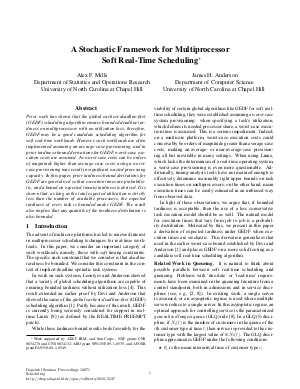A Stochastic Framework for Multiprocessor Soft Real-Time Scheduling
Authors James Anderson, Alex Mills
-
Part of:
Volume:
Dagstuhl Seminar Proceedings, Volume 10071
Part of: Series: Dagstuhl Seminar Proceedings (DagSemProc) - License:
 Creative Commons Attribution 4.0 International license
Creative Commons Attribution 4.0 International license
- Publication Date: 2010-05-03
File

PDF
DagSemProc.10071.4.pdf
- Filesize: 482 kB
- 10 pages
Document Identifiers
Subject Classification
Keywords
- GEDF
- multiprocessor
- tardiness
Metrics
- Access Statistics
-
Total Accesses (updated on a weekly basis)
0PDF Downloads0Metadata Views
Abstract
Prior work has shown that the global earliest-deadline-first (GEDF) scheduling algorithm ensures bounded deadline tardiness on multiprocessors with no utilization loss; therefore, GEDF may be a good candidate scheduling algorithm for soft real-time workloads. However, such workloads are often implemented assuming an average-case provisioning, and in prior tardiness-bound derivations for GEDF, worst-case execution costs are assumed. As worst-case costs can be orders of magnitude higher than average-case costs, using a worst-case provisioning may result in significant wasted processing capacity. In this paper, prior tardiness-bound derivations for GEDF are generalized so that execution times are probabilistic, and a bound on expected (mean) tardiness is derived. It is shown that, as long as the total expected utilization is strictly less than the number of available processors, the expected tardiness of every task is bounded under GEDF. The result also implies that any quantile of the tardiness distribution is also bounded. The uploaded paper is from the upcoming RTAS. I would like to hear suggestions about how to ease the assumption of independent execution times in this analysis.
Cite As Get BibTex
James Anderson and Alex Mills. A Stochastic Framework for Multiprocessor Soft Real-Time Scheduling. In Scheduling. Dagstuhl Seminar Proceedings, Volume 10071, pp. 1-10, Schloss Dagstuhl – Leibniz-Zentrum für Informatik (2010)
https://doi.org/10.4230/DagSemProc.10071.4
BibTex
@InProceedings{anderson_et_al:DagSemProc.10071.4,
author = {Anderson, James and Mills, Alex},
title = {{A Stochastic Framework for Multiprocessor Soft Real-Time Scheduling}},
booktitle = {Scheduling},
pages = {1--10},
series = {Dagstuhl Seminar Proceedings (DagSemProc)},
ISSN = {1862-4405},
year = {2010},
volume = {10071},
editor = {Susanne Albers and Sanjoy K. Baruah and Rolf H. M\"{o}hring and Kirk Pruhs},
publisher = {Schloss Dagstuhl -- Leibniz-Zentrum f{\"u}r Informatik},
address = {Dagstuhl, Germany},
URL = {https://drops.dagstuhl.de/entities/document/10.4230/DagSemProc.10071.4},
URN = {urn:nbn:de:0030-drops-25374},
doi = {10.4230/DagSemProc.10071.4},
annote = {Keywords: GEDF, multiprocessor, tardiness}
}
